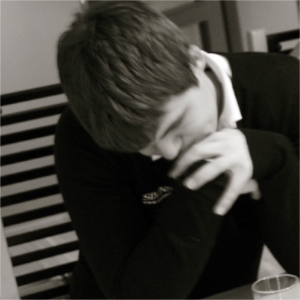He’s used to it by now, but Magnus Carlsen still doesn’t seem to thrive in the media spotlight. As Norway’s celebrated chess champ took a break on Wednesday from defending his title in New York, he could also enjoy a reprieve from the constant picture-taking, press grillings and performing in the proverbial fishbowl.

After four games played since the World Chess Championships began late last week, the score was even at 2-2. All four games between Carlsen and his Russian challenger Sergey Karjakin have ended in a draw, the latest coming Tuesday evening (the wee small hours of the morning on Wednesday back home in Norway). Some observers were already complaining on Sunday that the chess championships were bordering on being boring. Experts claimed Monday’s and Tuesday’s games, however, were highly memorable, not least the nearly seven-hour third game, and when Carlsen failed to break through Karjakin’s defense in the fourth.
Once again, Carlsen had to defend himself publicly afterwards, and he admitted to Norwegian Broadcasting (NRK) that he “threw away opportunities to win” both on Monday and Tuesday. “I don’t know how many I’ll get,” Carlsen said. “I have no strategy to exhaust him (Karjakin), but I have a strategy to play well.”

As the two young men in their mid-20s prepared for Thursday’s game, it’s worth noting how Carlsen has developed a certain patience with having to constantly explain himself. He’s come a long way from being the little “boy wonder” who once hid behind a screen when he had to join much older chess masters on a stage. He still claims he has not wanted to see the documentary film that premiered earlier this year about his life, full of vintage footage from this family’s home movies. At an informal meeting with foreign correspondents in his hometown of Oslo six years ago, Carlsen hardly smiled and literally squirmed in his seat, often hiding his face in his hands or staring expressionlessly. It was his ever-present father Henrik who chatted much more easily with local reporters, and tried to explain what made his son tick.
The elder Carlsen was still doing that this week, telling newspaper Aftenposten how his son’s chess performance as a child, and especially as a young teenager, turned family life upside down. “I though he could be a good chess player when he was four to five years old,” Henrik Carlsen said. The defining moment came in 2000, when his son was nine years old and beat a series of opponents at the Norwegian Championships for juniors who were believed to be better than Magnus. “Then I knew he could be really good,” Henrik Carlsen told Aftenposten. “When he was 12-13, folks began saying he could go all the way. That was difficult to relate to.”
The rest is history, and Magnus Carlsen was brimming with confidence as he headed into his third world championship tournament. In an interview with NRK, however, glimpses of the old introverted young Carlsen returned. He sat quietly with an empty gaze while the cameras were set up, and then admitted he still hadn’t seen “Magnus,” the movie, after its premiere because “I don’t like to see things about myself, it gets very near. After I’d done the interviews and gone through the filming, I felt a need to put it behind me.”
Asked if there was a personal cost to having to share himself, Carlsen replied “all the time, so, yeah.” He also admitted he gets “uncomfortable” when reporters’ questions veer away from chess. He told NRK he finds New York “exciting, but it craves energy to be here … there’s so much noise, always so much happening. There’s no rest.”

As reporters lined up for their few minutes with Magnus before the championships began last week, the young chess star seemed to accept, though, that it’s part of his job. He’s had to become more extroverted, whether he likes it or not. He’s had to put up with televised stunts, find something to say when the prime minister calls to congratulate him on a victory, play chess blindfolded against other sharp chess players and academics, and play against the likes of Microsoft founder Bill Gates, live on national TV in Scandinavia. He beat Gates handily.
Carlsen has always preferred being left alone, though, and withdrew from social situations even as a child. Old film footage shows him chatting amiably with family members over the years, but also sitting alone on a stone at an outdoor party, off by himself absorbed in books, and alone at the chess board. He told NRK he even had his own little dining table when he was a child, where he also sat and read books about chess. “Sometimes mama or papa would say ‘now you have to come and eat with the rest of us,’ but I would rather do my own thing,” Carlsen said.
Chess became his great escape. Atle Grønn, an author and chess player, has called chess “the perfect activity for those who are introverted. Chess is a means of hiding from society, and diving down into your own brain.”
On Thursday Carlsen will need to return to the spotlight but also to his beloved chess. Carlsen himself has spent a lot of time promoting chess in schools all over the world, is keen on raising its international profile and even joked during the Trump campaign that he wanted “to make chess great again.” And he’ll want to win again. The championships run until November 30, or whenever either Carlsen or Karjakin becomes the first to rack up 6.5 points. The prize pot is just over USD 1 million.
newsinenglish.no/Nina Berglund

